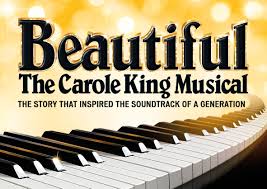King of the jukebox musicals
THEATER REVIEW
The murmurs from the audience — what Sarah Bockel, the current star of the national tour of “Beautiful,” told me she calls the “rustle, rustle, rustle” — first surfaced on Tuesday night with “Will You Love Me Tomorrow.” That’s what happens in this show when people recognize the introductory bars of the best known Carole King songs. Think of it as an autonomic nervous response for folks. They can’t help but shift in their seats, bring their hands together in an almost-clap and whisper the opening words of the tune.

The best part of “Beautiful: The Carole King Musical,” which opened for an eight-performance run at the Saroyan Theatre in a well-honed, emphatic and technically gorgeous performance, is this bond between music and audience. Most of the songs by King that prompt the outward display of affection from fans come in the second act, when selections from her famed “Tapestry” album (“It’s Too Late,” “A Natural Woman,” “You’ve Got a Friend”) get their big moments. But the first act, which focuses on King’s early days as a songwriter, is even more of a kick. Who remembered that she (and her husband, Gerry Goffin) were responsible for such tunes as “One Fine Day,” “Up on the Roof” and “Locomotion”?
This national tour is the real deal: an Actors Equity production with experienced actors (some from Broadway) and a first-rate scenic and lighting design to match. Here are some thoughts after opening night:
A top-notch narrative for a jukebox musical: Ever wonder why the plot of “Mamma Mia” is so goofy and ridiculous? I’m guessing no one really wanted to see a show about the life stories of the members of ABBA. With Carole King, however, book writer Douglas McGrath had rich material to mine. Her personal narrative — first song at 16, married young to her college sweetheart, years of marital troubles — sets up a powerful platform to talk about overcoming adversity and women’s empowerment. Sure, the story of “Beautiful” is most definitely King’s, and positions her if not as a saint then at least one of the most courageous and profoundly optimistic people you’ll ever meet. (Which is what happens when you collaborate on a Broadway musical about yourself.) But while we might not get a full picture of King, warts and all, we do get a piercing look at her pain. And that gives the show an impact beyond that of most jukebox musicals.
A powerful Carole: Bockel impressed me with her strong voice. Her vocals never seem like an imitation of King’s but still references her. And her dramatic dexterity shines on stage. This role requires someone to go from wide-eyed teenager to emotionally trampled middle-aged woman, and Bockel finds some of the subtleties in between.
A sturdy supporting-couple storyline: Another big reason for “Beautiful’s” appeal is that it doesn’t focus solely on Carole and her relationship with Gerry (Andrew Brewer, the only one of the four principals who didn’t make much of an impression on me). We get the secondary story of Cynthia Weil (a standout Sarah Goeke) and Barry Mann (Jacob Heimer). They are friends (and friendly rivals) of Carole and Gerry, but instead of mining that rivalry for dramatic tension, the narrative focuses instead on their passionate and prickly relationship. Putting the spotlight on Cynthia and Barry also gives the show the chance to toss in a bunch more well-known tunes, including “On Broadway,” “We Gotta Get Out of This Place” and “You’ve Lost That Lovin’ Feeling.” Goeke, as Cynthia, has a punchy and magnetic stage presence, and she excels in the role.
The ensemble: I’m used to high standards for touring shows, but the execution of Josh Prince’s choreography is very nearly flawless in terms of form and precision in such numbers as “Locomotion” and “On Broadway.” Acting/vocal standouts include Alexis Tidwell as Little Eva and McKynleigh Alden Abraham (in a thankless Other Woman role) singing a nuanced version of “One Fine Day.”
The scenic and lighting design: I got the chance to see “Beautiful” on Broadway, and I was curious if the national tour would be able to replicate the seamless scenic transitions between scenes, which include sliding set pieces, a piano that rotates and furniture that glides off and on in just seconds. The answer is yes. The sophisticated design gives an even greater professional polish to the show. The lights, too, are exquisite. I love the color combinations: the turquoises, soft lavenders, vivid reds, brassy yellows and bold blues all adding to the effect.
The takeaway: As I walked out, a friend noted that his mom when he was a kid used to put on “Tapestry” while she did Saturday housework. It reminded me that some musicians are lucky (and talented enough) to become the soundtrack for people’s lives. Maybe that’s why “Beautiful” feels so comfortable and full of joy.
Related story
Tuesday is ‘One Fine Day’ for Carole King fans: Broadway in Fresno brings the national tour of ‘Beautiful: The Carole King Musical” to the Saroyan.
To subscribe to the email newsletter for The Munro Review, go to this link:









mystories427
Perceptive review, but one quibble: “emotionally trampled middle-aged woman”? King was 29 when she released Tapestry and gave that Carnegie Hall concert! You have an interesting definition of middle age. 😉
Donald Munro
You got me there. Somehow I got the idea that King was older than just 29! I was 7 when “Tapestry” came out, so maybe I just thought at the time that everyone over 20 was ancient. 🙂
mystories427
I was in high school. She and Joni Mitchell were huge role models for me. There were other singers I loved dearly, but I loved it that they wrote their own songs. King married and had her first two kids so young that she seems older by the end of the play. As it happens, she married her bass player and had two more kids before they split up. Then two more marriages that didn’t last. But she’s still kicking. When Gerry died, she said very nice things about him. Some people found his role in the play confusing or underwritten, but she was the focus, not him. I thought they found a good balance. Too much about his mental illness and things could have gotten too dark pretty quickly. Bipolar disorder can have devastating effects on relationships. The audience really seemed to connect to her journey and the triumph of talent and perseverance.